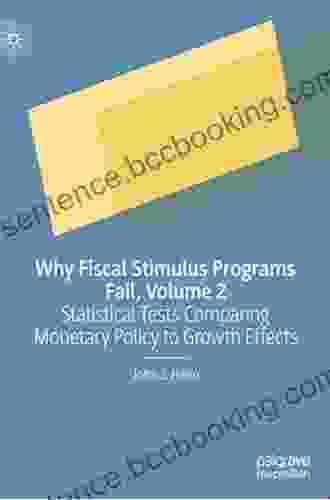Why Fiscal Stimulus Programs Fail: A Comprehensive Analysis

The concept of fiscal stimulus has been a subject of intense debate among policymakers and economists for decades. Proponents of fiscal stimulus argue that it can boost economic growth by increasing aggregate demand, while opponents maintain that it often leads to higher inflation and debt without significant economic benefits. In this comprehensive analysis, we will delve into the various reasons why fiscal stimulus programs often fall short of their intended goals.
Keynesian Economics and the Rationale for Fiscal Stimulus
The theoretical basis for fiscal stimulus lies in Keynesian economics, which emphasizes the role of aggregate demand in determining economic output. Keynesian economists argue that during periods of economic downturn, reduced consumer and business spending can lead to a downward spiral, resulting in recession or even depression. Fiscal stimulus aims to address this issue by increasing government spending or reducing taxes, thereby increasing aggregate demand and stimulating economic activity.
4.3 out of 5
| Language | : | English |
| File size | : | 41482 KB |
| Text-to-Speech | : | Enabled |
| Screen Reader | : | Supported |
| Enhanced typesetting | : | Enabled |
| Word Wise | : | Enabled |
| Print length | : | 711 pages |
Empirical Evidence against Fiscal Stimulus
Despite the theoretical appeal of fiscal stimulus, empirical evidence often paints a different picture. Numerous studies have shown that fiscal stimulus programs often fail to deliver the desired economic boost, and in some cases, can even have negative consequences.
1. Crowding Out of Private Investment
One of the main reasons fiscal stimulus can be ineffective is that it can lead to crowding out of private investment. When the government increases its spending, it typically does so by borrowing, which raises interest rates. Higher interest rates make borrowing more expensive for businesses and consumers, reducing their incentive to invest and spend. This effect can offset the initial increase in aggregate demand caused by fiscal stimulus.
2. Inflationary Pressures
Another potential downside of fiscal stimulus is that it can lead to inflationary pressures. When the government increases its spending, it puts upward pressure on prices, as demand for goods and services exceeds supply. This can erode purchasing power and reduce the effectiveness of the stimulus program.
3. Increased Government Debt
Fiscal stimulus programs often lead to significant increases in government debt. This can have long-term negative consequences for the economy, including higher interest payments, reduced public investment, and lower credit ratings. In some cases, excessive government debt can lead to fiscal crises and loss of confidence in the economy.
4. Inefficiencies and Misallocation of Resources
Government spending is often less efficient than private spending. Government projects may be subject to political considerations rather than economic rationality, leading to misallocation of resources and reduced productivity. Additionally, the increased demand generated by fiscal stimulus can lead to higher prices for scarce resources, further reducing its effectiveness.
Exceptions and Limitations
It is important to note that the failure of fiscal stimulus programs is not universal. In certain circumstances, such as during deep recessions or financial crises, fiscal stimulus can provide a necessary boost to the economy. However, it should be used judiciously and as a temporary measure, rather than as a long-term solution to economic problems.
Policy Implications
The empirical evidence against fiscal stimulus suggests that policymakers should be cautious when considering such programs. Instead, they should focus on policies that promote sustainable economic growth, such as:
- Reducing regulatory barriers to business and investment
- Enhancing education and skills training
- Improving infrastructure
- Promoting innovation and technological advancement
- Maintaining a stable and predictable macroeconomic environment
While fiscal stimulus programs may have intuitive appeal, empirical evidence suggests that they often fail to deliver the desired economic benefits. They can lead to crowding out of private investment, inflationary pressures, increased government debt, and inefficiencies. Policymakers should therefore be wary of relying too heavily on fiscal stimulus and should instead focus on policies that promote sustainable economic growth and development.
4.3 out of 5
| Language | : | English |
| File size | : | 41482 KB |
| Text-to-Speech | : | Enabled |
| Screen Reader | : | Supported |
| Enhanced typesetting | : | Enabled |
| Word Wise | : | Enabled |
| Print length | : | 711 pages |
Do you want to contribute by writing guest posts on this blog?
Please contact us and send us a resume of previous articles that you have written.
 Book
Book Novel
Novel Page
Page Chapter
Chapter Text
Text Story
Story Genre
Genre Reader
Reader Library
Library Paperback
Paperback E-book
E-book Magazine
Magazine Newspaper
Newspaper Paragraph
Paragraph Sentence
Sentence Bookmark
Bookmark Shelf
Shelf Glossary
Glossary Bibliography
Bibliography Foreword
Foreword Preface
Preface Synopsis
Synopsis Annotation
Annotation Footnote
Footnote Manuscript
Manuscript Scroll
Scroll Codex
Codex Tome
Tome Bestseller
Bestseller Classics
Classics Library card
Library card Narrative
Narrative Biography
Biography Autobiography
Autobiography Memoir
Memoir Reference
Reference Encyclopedia
Encyclopedia Orlando Wilson
Orlando Wilson Jon Arild Johannessen
Jon Arild Johannessen Tristan Pulsifer
Tristan Pulsifer Joanne B Freeman
Joanne B Freeman Johan Nerholz
Johan Nerholz John Clayton
John Clayton Joanna Wells
Joanna Wells John Howells
John Howells Jodi Lee
Jodi Lee Nadja Sarell
Nadja Sarell John L Havlin
John L Havlin Patricia Stacey
Patricia Stacey Joel S Moskowitz
Joel S Moskowitz Kim Smith
Kim Smith Julie Muller Volb
Julie Muller Volb Lynne V Cheney
Lynne V Cheney Miranda Paul
Miranda Paul John Dower
John Dower Kai Nacke
Kai Nacke Sue Dicicco
Sue Dicicco
Light bulbAdvertise smarter! Our strategic ad space ensures maximum exposure. Reserve your spot today!

 Ivan TurgenevThe Opposite Of Comfortable: A Transformative Journey to Personal Growth and...
Ivan TurgenevThe Opposite Of Comfortable: A Transformative Journey to Personal Growth and... Drew BellFollow ·19.5k
Drew BellFollow ·19.5k Gary CoxFollow ·4.2k
Gary CoxFollow ·4.2k Rudyard KiplingFollow ·8k
Rudyard KiplingFollow ·8k Ken FollettFollow ·8.1k
Ken FollettFollow ·8.1k Samuel WardFollow ·10.6k
Samuel WardFollow ·10.6k Mark MitchellFollow ·15.8k
Mark MitchellFollow ·15.8k Sidney CoxFollow ·10.3k
Sidney CoxFollow ·10.3k Ezekiel CoxFollow ·9.5k
Ezekiel CoxFollow ·9.5k

 Jesus Mitchell
Jesus MitchellDiscover the World of Satisfying Meals with Or...
In a world where culinary creations often...

 Darius Cox
Darius CoxJourney into the Extraordinary Life of Kublai Khan: An...
Immerse Yourself in the Fascinating...

 Gil Turner
Gil TurnerThe Fourth Industrial Revolution: The Precariat and the...
In his groundbreaking book, The Fourth...

 Jonathan Franzen
Jonathan FranzenGenghis Khan: His Heirs and the Founding of Modern China
Genghis Khan, the...

 Eugene Powell
Eugene PowellJourney Through the Golden Age of the Ottoman Empire with...
Delve into the Enchanting World of the...
4.3 out of 5
| Language | : | English |
| File size | : | 41482 KB |
| Text-to-Speech | : | Enabled |
| Screen Reader | : | Supported |
| Enhanced typesetting | : | Enabled |
| Word Wise | : | Enabled |
| Print length | : | 711 pages |












